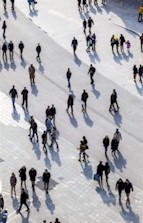
Paradoxically, the same material abundance of the post-World War II era that made their Depression-battered parents feel content and satisfied with their later lives may have been a significant factor in the Woodstock generation’s dissatisfaction.
In most of human history, having a comfortable dwelling, abundant food, and clean clothes had been available only to a relatively small subset of the population. This group was simultaneously esteemed and envied by everyone else—providing its members ongoing confirmation of their status as “somebodies.”
But when these amenities became affordable to almost everybody, no one could feel special anymore just for having them. In fact, continuing to devote a lot of attention or effort to getting more of them began to seem less like an inspiring or worthy goal, and more like some sort of pitiably odd compulsive hoarding disorder.
It was thus no mere coincidence that people of the Woodstock generation typically wanted to do something with their lives that they considered more significant. They wanted to somehow benefit society at large—whether directly, through programs to help under-served communities; or more indirectly, via creative works, or through participation in efforts to curb pollution, or save wildlife or wildlands. It was common during this era to hear our peers discuss these as their primary goals, and making a lot of money as only a sort of consolation prize in the event their real ambitions didn’t pan out.
In more traditional times, such lofty goals were typically held mainly by scions of the uppermost social strata, and were not exactly widespread even there. Why did so many of us baby boomers, from across the spectrum of socio-economic backgrounds, feel like we would have failed if we didn’t achieve something of notable benefit to society at large?
Perhaps the most obvious explanation is that we inwardly sensed (even if we never talked about it) that without such grand achievements, we’d all be nobodies.


